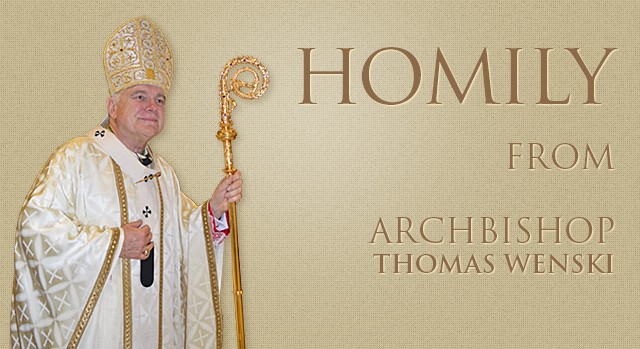By Archbishop Thomas Wenski - The Archdiocese of Miami
Archbishop Thomas Wenski preached this homily at the vigil Mass for the second Sunday of Advent, Dec. 9, 2017, at St. Mary Cathedral, Miami.
The Advent Season which beckons us to “prepare the way of the Lord” who comes to live among us is essentially about hope. Because God has revealed himself to us through his Son born of the Virgin Mary, we Christians know that we have a future. That future as expressed in the words of the old Baltimore Catechism is simply “to be happy with God in heaven.” Because of Jesus’ redeeming death and resurrection our future hope is not illusory but trustworthy � for Jesus will not disappoint.
The crisis of our age can rightly be described as a crisis of hope. The social pathologies of our time � abortion, drug abuse, promiscuity, divorce and the breakup of the family � are symptomatic of a loss of hope. A woman who would kill the fruit of her womb has no hope for the future � for children are the hope of the future. A man who would poison himself through drug abuse sees no future for himself. Even among those who nominally identify themselves as Christians or Catholics betray a loss of hope in their abandonment of regular church attendance and reception of the sacraments: for prayer is essentially an expression of hope. Only those who hope pray.
The modern age was born in the Enlightenment philosophies of the 17th and 18th centuries. These philosophies essentially denied that man was made for anything more than to die. Closing the door to the Infinite meant closing the door to a future of hope. Then in the 19th and the 20th centuries, various ideologies, thinking that the possibility of any heavenly paradise was effectively debunked, offered ersatz hopes promising earthly paradises. Rather than delivering “heaven on earth,” these ideologies � whether political, like communism or fascism, or social, like consumerism or hedonism � brought “hell on earth.” Faith in “science” or in “progress” has also proven a disappointingly untrustworthy substitute for Christian hope. “Man needs God; otherwise he remains without hope (SS #23).
As Christians, we know we have a future � a future revealed to us by the Son of God who in taking on our flesh pitches his tent in our midst only to lead us to communion with the Father. This hope is trustworthy, as the lives of the saints give witness � and thus hope enables us to face our present. This was essentially the insight of Viktor Frankel, who reflecting on his experience in a concentration camp in WWII, said: You can survive any “how,” if you have a “why.” And as Pope Benedict wrote in Spe Salvi: “the present, even if it is arduous, can be lived and accepted if it leads towards a goal, if we can be sure of this goal, and if this goal is great enough to justify the effort of the journey (SS #1)
Advent invites us to make the effort of the journey. “Repent and make straight your paths.” As the Pope wrote, “all serious and upright human conduct is hope in action.” (SS #35) And the Lord who is the goal towards which our existence is orientated has already set out to meet us. It is in this encounter with the Living God that all our hopes find their fulfillment � for in the words of St. Augustine, “Our hearts were made for thee, O God; and they shalt not rest until they rest in thee.”

